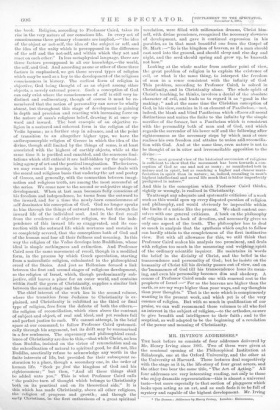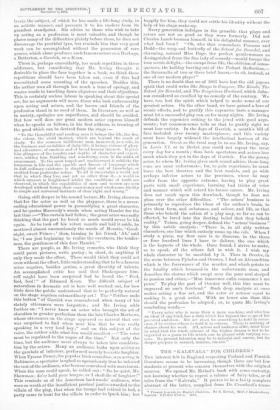MR. IRVING'S ADDRESSES.* THE book before us consists of four
addresses delivered by Mr. Henry Irving since 1881. Two of them were given at the sessional opening of the Philosophical Institution at Edinburgh, one at the Oxford University, and the other at the University at Harvard. These lectures deal respectively with the stage as it is, the life-story of four great actors, and the other two bear the same title, "The Art of Acting." All four addresses are very interesting reading, not only to those who enjoy dramatic representation—this is almost a universal taste—but more especially to that section of playgoers which looks upon acting as an art, and as such feels it to be full of mystery and capable of the highest development. Mr. Irving * The Drama Aaareesos by Henry Irving. London : Iloinemann.
treats the subject, of which he has made a life-long study, in an artistic manner, and presents it to his readers from its grandest standpoint. His advice to those who wish to take up acting as a profession is most valuable, and though he places many of the difficulties plainly before them, he does not discourage the youthful tyro, but reminds him that very good work can be accomplished without the possession of rare genius, which alone produces such famous actors as a Burbage, a Betterton, a Garrick, or a Kean.
There is, perhaps unavoidably, too much repetition in these addresses, but considering that Mr. Irving thought it desirable to place the four together in a book, we think these repetitions should have been taken out, even if this had necessitated some recasting of the speeches. Besides this, the author uses all through too much a tone of apology, and wastes words in knocking down objectors and their objections. This is certainly useless labour in speaking about this special art, for no arguments will move those who look unfavourably upon acting and actors, and the lovers and friends of the profession stand in no need of them. In literature, as well as in society, apologies are superfluous, and should be avoided. But how well does our great modern actor express himself when he speaks as follows, in his first address, in treating of the good which can be derived from the stage:—
" To the thoughtful and reading man it brings the life, the fire, the colour, the vivid instinct, which are beyond the reach of study, To the common indifferent man, immersed, as a role, in the business and soeialities of daily life, it brings visions of glory and adventure, of emotion and of broad human interest. It gives him glimpses of the heights and depths of character and experi- ence, setting him thinking and wondering, even in the midst of amusement. To the most tepid and unobservant it exhibits the humorous in life and the sparkle and finesse of language which in dull ordinary existence is stupidly shut out of knowledge, or omitted from particular notice. To all it uncurtains a world, not that in which they live, and yet no other than it,—a world in which interest is heightened whilst the conditions of truth are observed, in which the capabilities of men and women are seen developed without losing their consistency and wholesome fidelity to simple and universal instincts of clear right and wrong."
Going still deeper in his second lecture, Mr. Irving shows us that for the actor as well as the playgoer, there is a never- ending educational power in personifying a great character, and he quotes Macready's words when acting Hamlet for the last time :—" The curtain had fallen ; the great actor was sadly thinking that the part he loved so much would never be his
again. As he took off his velvet mantle and laid it aside, he muttered almost unconsciously the words of Horatio, ' Good- night, sweet Prince ; ' then, turning to his friend, Ah,' said he, 'I am just beginning to realise the sweetness, the tender- ness, the gentleness of this dear Hamlet.' " There are people, as Mr. Irving remarks, who think they could paint pictures, write poetry ; in short, do anything if only they made the effort. These would think they could act even without the effort, little understanding that to be a famous actor requires, besides genius, a great diversity of talents. An accomplished critic has said that Shakespeare him- self might have been surprised had he heard the " Fool, fool, fool !" of Edmund Kean. The difficult subject of naturalism in dramatic art is here well worked out, for how little does the public understand that to be perfectly natural on the stage requires extraordinary art ! The "Prithee undo this button " of Garrick was remembered when many of his stately utterances were forgotten ; and Mr. Irving adds further on : "I never knew an actor who brought the art of elocution to greater perfection than the late Charles Mathews, whose utterances on the stage appeared so natural that one was surprised to find when near him that he was really speaking in a very loud key ;" and on this subject of the voice, the author adds what few would recollect The voice must be regulated to the vogue of the time." Not only the time, but the audience must always be taken into considera- tion by the actors. Many an audience looks upon acting as the gambols of inferiors, performed merely to excite laughter. When Tyrone Power, the popular Irish comedian; was acting in Baltimore, a spectator laughed so uproariously that he infected the rest of the audience, who became convulsed with merriment. When the man could speak, he called out : " Do be quiet, Mr. Showman; do'ce hold your tongue, or I shall die of laughter I" This reminds us of the American backwoods' audience, who were so wroth at the insufficient poetical justice awarded to the villain of the play, that when the troupe had retired Co bed, a party came to hunt for the villain in order to lynch him; but happily for him, they could not settle his identity without the help of his stage make-up.
Every generation indulges in the grumble that plays and actors are not as good as they were formerly. Did not Charles Lamb bemoan himself, in his delightful manner, over what had been P " Oh, who that remembers Parsons and Dodd—the wasp and butterfly of the School for Scandal, and
charming, natural Miss Pope, the perfect gentlewoman as distinguished from the fine lady of comedy—would forego the true scenic delight,—the escape from life, the oblivion of conse- quences, the holiday barring-out of the Pedant Reflection,—
the Saturnalia of two or three brief hours,—to sit, instead, at one of our modern plays P" There is no doubt that we of 1893 have lost the old joyous spirit that could write She Stoops to Conquer, The Rivals, The School for Scandal, and The Suspicious Husband, which John- son considered as excelled by no comedy of the century. We have, too, lost the spirit which helped to make some of our greatest actors. On the other hand, we have gained a love of scenic effects, and to gratify this expensive taste a manager must let a successful play run on for many nights. Mr. Irving defends the expensive setting to the jewel with good argu- ments; but commonsense tells us that to gratify sight we must lose variety. In the days of Garrick, a month's bill of fare included over twenty masterpieces ; and this variety must have largely widened the intellectual horizon of the generation. Great as the treat may be to see Mr. Irving, say, in Louis XI. or in Becket, you could not repeat the treat every day for a month ; thus both spectators and actors lose much which they got in the days of Garrick. For the young actor, to whom Mr. Irving gives such sound advice, these long runs are most unfortunate; for, to gain experience, he must leave the best theatres and the best models, and go with perhaps inferior actors to the provinces, where he may suffer from the opposite extreme, having to play great parts with small experience, learning bad tricks of voice and manner which will retard his future career. Mr. Irving does not touch upon this drawback, though he does not gloss over the other difficulties. " The actors' business is primarily to reproduce the ideas of the author's brain, to give them form, and substance, and colour, and life, so that those who behold the action of a play may, so far as can be effected, be lured into the fleeting belief that they behold reality," Talma, going deeper, defined the "actors' business" by this subtle analysis : " There is, in all ably written characters, one line which entirely sums up the rule. When I study a piece, my first care is to discover, in the three or four hundred lines I have to deliver, the one which is the keynote of the whole. Once found, I strive to make, so to speak, all the others fall in with it. I wish my whole character to be moulded by it. Thus in Orestes, in the scene between Pylades and Orestes, I find an Alexandrine which is the forerunner of the murder, and which points to the fatality which hemmed-in the unfortunate man, and describes the storms which swept over the poor soul steeped in passion and crime,—' Mon innocence enfin commence ii me peser.' To play the part of Orestes well, this line must be engraved on one's forehead." Such deep analysis at once makes acting a fine art, and the actor or actress equal to making it, a great artist. With no lower aim than this should the profession be adopted ; or, to quote Mr. Irving's concluding words,-
" Every actor who is more than a mere machine, and who lies an ideal of any kind, hes a duty which lies beyond the scope of his personal ambition. His art must bo something to hold in Fever-, epee, if he wishes others to hold it in esteem. There is nothing of chance about his work. All, actors and audience alike, must bear in mind that the whole scheine of the higher drama is not to be regarded as a game in life which can be played with varying suc- rose. Its present intention may be to interest and amuse, but its deeper purpose is earnest, intense, sincere."





















































 Previous page
Previous page